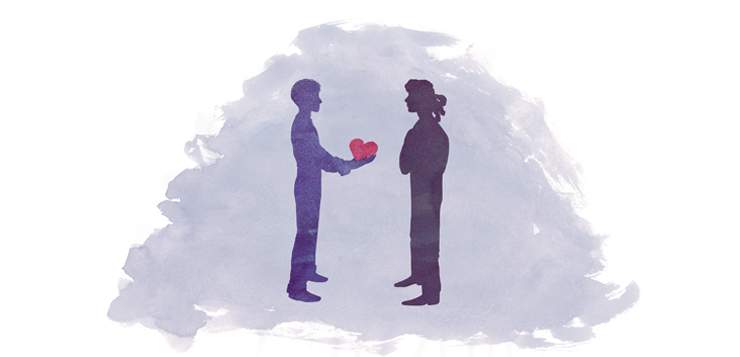I first read Lord of the Flies when I was 15, and my family was on sabbatical in Nottingham, England—for me, the misty land of Robin Hood and D. H. Lawrence. William Golding’s tale of the shipwrecked boys’ descent into depravity—with painted faces, chants, torture of Piggy, and thirst for blood—seemed to resemble the recession-mired England I came to know that year: a place of bullying, teachers humiliating hooligans, 15-year-olds getting drunk at pubs, and skirmishes between the punks and the Teddy boys at school dances.
At the heart of Lord of the Flies is a thought experiment known as the “natural state experiment.” It asks, What are people like if you put them in a context in which civilization is stripped away, leaving them to behave in their natural state? Absent, in Golding’s terms, “the protection of parents and school and policemen and the law,” what do people do? For many, answers to such thought experiments reveal common assumptions about human nature: that free of the structures and strictures of society, our base and violent tendencies spring forth.
Lord of the Flies begins with an election. The boys are to choose between Ralph, who is respectful, calm, and physically imposing, and Jack, who is obsessed with weaponry, meat, tribal markings, and killing the island’s pigs. The boys cast their first votes for Ralph and start forming a society with democratic dialogue, rules, schedules, and duties. It is only a matter of time, though, before Jack grabs power. He converts the young boys to his cause with face painting. He rules his recruits through coercive bouts of bullying and by telling them chilling tales of supernatural monsters hovering in the forest nearby. By the end of the book, Jack and his tribe are hunting down Ralph as their cannibalistic calls pierce the air.
This view of power as coercive is prevalent in our culture, and it has been deeply and enduringly shaped by Niccolò Machiavelli and his powerful 16th-century book The Prince. In that book the Florentine author argued that power is, in its essence, about force, fraud, ruthlessness, and strategic violence. Following Machiavelli, the widespread tendency has been to think of power as involving extraordinary acts of coercive force.
Power was what the great dictators wielded; power was embodied in generals making decisive moves on battlefields, businessmen initiating hostile takeovers, coworkers sacrificing colleagues to advance their own careers, and bullies on the middle-school playground tormenting smaller kids.
To try to see how power actually works in the social groups we inhabit, I have infiltrated college dorms, sororities, fraternities, and children’s summer camps to document who rises in power. I have captured the substance and spread of reputations and surreptitiously identified which members of groups are gossiped about, and who receives gossip.
Whereas the Machiavellian approach to power assumes that individuals grab it through coercive force, strategic deception, and the undermining of others, the scientific work I’ve been doing finds that power is not grabbed but is given to individuals by groups.
What this means is that your ability to make a difference in the world is shaped by what other people think of you. Your capacity to alter the state of others depends on their trust in you. Your ability to empower others depends on their willingness to be influenced by you. Your power is constructed in the judgments and actions of others. This idea distills down to four principles: groups give power to those who advance the greater good, construct reputations that determine one’s capacity to influence, bestow status and esteem on those who advance the greater good, and resort to gossip to punish those who undermine the greater good.
A Laboratory to Study Power and Influence
Natural state thought experiments, like Lord of the Flies, are theoretically compelling but are difficult to pull off scientifically. As we enter just about any situation—arriving at kindergarten for the first day, socializing in college, joining the workforce, or making friends on Facebook—we already belong to a social class, a neighborhood, a family with a lineage and history, and an ethnic tribe. But a dorm hall at a large public university is a good choice for such an experiment. The late teen years are a developmental period when young women and men become acutely aware of their power; their social rank says a great deal about the social gatherings they will be invited to and what kind of sexual life they will enjoy or be reduced to yearning for. The standardized conditions of dorm life—9-by-12-foot rooms, a shared address, and mass-produced cafeteria food— minimize class-related differences of neighborhood, lifestyle, and domicile.
Some 20 years ago I secured the participation of one hall in a first-year dorm at the University of Wisconsin in Madison. Some students were wealthy, some were middle class, and some were poor: they were representative of the distribution of wealth and class in the United States. My plan was to carry out a natural state experiment and document who rose to power.
At the start of the semester, I had students indicate how much “influence” every other person in their hall had. They also filled out a questionnaire that asked them to report on the extent to which their own personalities are defined by five social tendencies, five general ways of acting in the world, known as the Big Five: enthusiasm, kindness, focus, calmness, and openness.
I returned four months later, and then again at the nine-month point, to ask participants to report on their fellow dorm members’ power. For each person in the dorm, I tallied up all the other dorm members’ ratings of his or her power at the start, middle, and end of the academic year. I found that power flowed quickly to certain individuals: by two weeks into the school year, some students already had more power than others. And I found flux: every student’s level of power in his or her peers’ eyes fluctuated over the year.
What Groups Value in Others
Who rose to power? Who did the groups give power to and construct more favorable reputations of? We have a deep cultural intuition that nice guys finish last, that one must step on others to rise in the ranks, and that acquiring power requires the cold-blooded dispensing of rivals and even allies. But nothing could have been further from the truth. In my experiment, the strongest predictor of which dorm dwellers rose to the top within the first week of arriving at college, and which ones remained there through the year, was enthusiasm.
The other four elements in the Big Five mattered as well: kindness, focus, calmness, and openness also related to students’ power. I went on to replicate these findings in a Vanderbilt sorority, in a Wisconsin fraternity, in Berkeley dorms, and even in a summer basketball camp. But studies that rely solely on US college students are limited in profound ways. Young adults, typically from middle- or upper-class backgrounds, enjoying the freedom of college and the privileges of an advanced education, are a thin slice of humanity, and data coming from them may not say much about the world outside the ivory tower.
Power in Many Walks of Life
Other social psychologists have studied who rises in power in different arenas. In financial firms, hospitals, and manufacturing plants, they track who is promoted to high-level management positions or is judged to be effective as a leader. In schools, they track those who serve on student council, those whom their peers regard as good leaders, and those who are popular. In the military, they track which recruits become officers. The samples are diverse with respect to social class, gender, and ethnicity. And across all 70 studies, those who rose to power were those who had all of the Big Five.
Groups give us power when we are enthusiastic, speak up, make bold assertions, and express an interest in others. Our capacity to influence rises when we practice kindness, express appreciation, cooperate, and dignify what others say and do. We rise in power when we provide
calm and remind people of broader perspectives during times of stress, tell stories that
calm during times of tension, and practice kind speech. Our opportunity for influence increases when we are open and ask great questions, listen to others with receptive minds, and offer playful ideas and novel perspectives.
By contrast, exploitative, selfish, coercive behavior unravels the fabric of strong groups. Groups know this and also have histories with individuals who abuse power and act in greedy and impulsive ways. So groups choose to give power to people who are enthusiastic, kind, focused, calm, and open. They construct reputations that track an individual’s capacity to act on behalf of the group, and they rely on these reputations to collaborate, cooperate, and build alliances and strong ties. They elevate the status of those who share, and they tarnish the reputations of the selfish and the Machiavellian. Power is not grabbed. It is given.
read more
Guided Meditation: Offering Loving-Kindness to Yourself and Others
Loving-kindness expert Sharon Salzberg guides an 8-minute meditation for wishing everyone around us well—including ourselves. Read More
Survival of the Kindest
Without compassion we wouldn’t survive. Yet it’s not always easy to bring compassion into daily life. Learn to strengthen your empathy muscle with these 11 tips and insights. Read More
How to Care Deeply Without Burning Out
Sharon Salzberg and Dan Harris explore how to recognize the signs of empathy fatigue and maintain a balanced, mindful, compassionate response. Read More






